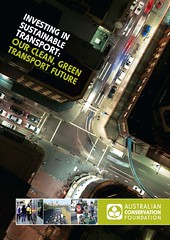 A new report by the Rapid Active & Affordable Transport Alliance (RAATA), Investing in sustainable transport: Our clean, green transport future, urges the Federal Government to catch up on years of neglect by investing two thirds of the transport budget in public and active transport measures.
A new report by the Rapid Active & Affordable Transport Alliance (RAATA), Investing in sustainable transport: Our clean, green transport future, urges the Federal Government to catch up on years of neglect by investing two thirds of the transport budget in public and active transport measures.
Speaking today at the report launch in Canberra, ACF executive director Don Henry said public and active transport infrastructure has been neglected for too long and some money allocated to roads should be spent on public and active transport infrastructure.
“Climate change and peak oil are key challenges for Australia. Investment in public and active transport infrastructure will help make Australia more sustainable, reduce greenhouse gas emissions and help wean us off our addiction to oil,” Mr Henry said.
“For the same amount of money currently being spent on roads, we can provide more transport services for more people.”
Heart Foundation National CEO Dr Lyn Roberts said we must change the way Australia moves.
“More than 16,000 Australians are estimated to die prematurely each year, mostly from heart disease and stroke, because they are insufficiently physically active. Physical inactivity also costs the community an estimated $13.8 billion a year,” Dr Roberts said.
“We need to make the healthier transport choices walking, cycling, public transport the easier choices. And we need to replan our communities to promote physical activity not obesity.”
Diabetes Australia CEO Matt O Brien also talked about the benefits of active transport.
“Active community environments that encourage walking, bike riding and incidental exercise can help reduce overweight and obesity. People who are overweight or obese are at a much higher risk of developing type 2 diabetes. This is of grave concern in Australia as the number of new cases of diabetes each year would fill the Melbourne Cricket Ground; that is 275 new cases every day,” said Mr O Brien.
Chairman of Bus Industry Confederation Scott Grenda said the Government should be congratulated on the first steps towards addressing the public transport shortfall, announced in the recent budget.
“It’s clear Australia requires a national moving people strategy. It s in the national interest for the Commonwealth to be involved in the provision of public transport to address the congestion, climate change and social isolation to name a few,” said Mr Grenda.
“This joint initiative will hopefully be the start of not only the Government addressing these issues, but also the Opposition. This issue requires a bi-partisan approach where political parties all agree on the importance of getting right how move people.”
RAATA comprises the Australian Conservation Foundation, ACTU, Australian Association for the Study of Peak Oil and Gas (ASPO), Bicycle NSW, Bus Industry Confederation, City of Sydney, Diabetes Australia, Environment Victoria, Get Up, Heart Foundation, Conservation Council of South Australia, Conservation Council of Western Australia, Nature Conservation Council of NSW, Queensland Conservation, Public Transport Users Association, Rail Tram and Bus Union and International Association of Public Transport (UITP).

